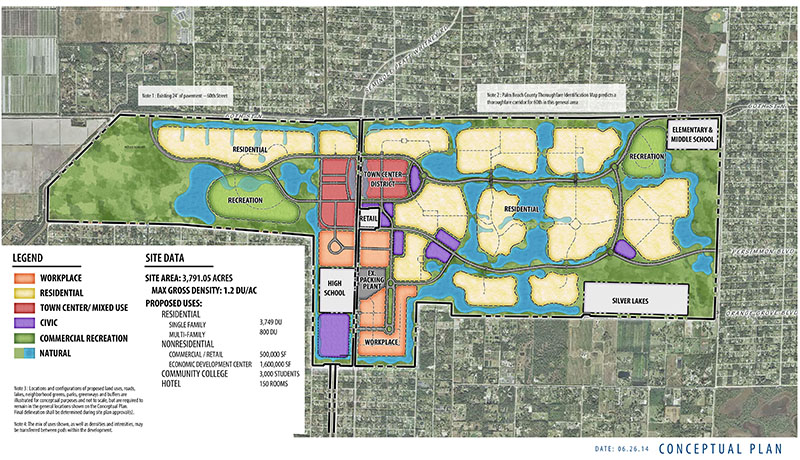As the newly created City of Westlake moves forward with development on the 3,800-acre former Callery-Judge Grove property, Palm Beach County officials and nearby residents are questioning the legitimacy of the incorporation process, which involved only five voters.
It also involved the rewriting of state laws to allow the process to happen.
“We have seen a very bad example of what can happen with something like that in our statutes,” County Commissioner Melissa McKinlay told the Town-Crier on Wednesday. “The problem is more along the lines of, are the people who voted to incorporate truly residents of Westlake, formerly the Seminole Improvement District? Was that whole process legitimate? That is what the governor needs to investigate.”
Immediately after the vote for incorporation, McKinlay sent a letter to Gov. Rick Scott asking for an investigation into the process.
“As the county commissioner elected to serve the area of central Palm Beach County commonly known as The Acreage, I am extremely concerned about the circumstances surrounding the recent conversion of the Seminole Improvement District into Palm Beach County’s 39th municipality called Westlake,” McKinlay wrote to Scott in a letter dated June 23.
She wrote that agricultural enclave legislation enacted in 2008 and 2012 paved the way for an improvement district to convert to a municipality without going through the lengthy process wherein resident input is paramount.
The previous process also reserved a role for the county, state and nearby municipalities in an incorporation effort.
Attorney Terry Lewis, representing the Seminole Improvement District, responded in a letter to the governor dated June 24 that McKinlay acknowledges that there is a legal mechanism for qualifying special districts to become a municipality through the new process.
“Palm Beach County was both aware of and participated in the same legislative process and has been aware since 2012 that it could be utilized,” Lewis wrote, continuing that McKinlay’s letter appears to indicate that the statutory process was complied with.
“The conversion process was followed carefully, and after adoption of a municipal conversion and incorporation plan, the electors of the district unanimously endorsed the plan in a referendum election held for that purpose,” Lewis continued. “Those results were tabulated and certified by the canvassing board on June 20, 2016. The City of Westlake was created immediately upon certification of the results of the referendum election.”
But more recently, McKinlay said neighboring residents had sent her correspondence indicating that at least one of the voters was not a legitimate resident of Westlake. It has also been reported that one of the founding members of the Westlake City Council was residing in the Palm Beach County Jail at the time that the new city was created.
“There have been some Facebook postings by one of the voters who voted to incorporate where she admits that she doesn’t live there, so I think their true residency comes into question,” McKinlay said. “That is the part that needs to be investigated. Were they legitimate residents when they voted to move forward with incorporation? I don’t think it was done appropriately.”
She also questioned the validity of Westlake not requiring that some of its council members live in the municipality, and pointed out that elected officials, including county commissioners, must live in the district where they were elected.
In her letter to the governor, McKinlay points out that Westlake’s charter requires that only two of the five transitional council members reside in Palm Beach County.
“To my understanding, there is nothing in the statutes that requires city officials to live in their district unless it is specifically outlined in the city’s charter, so cities implement their own residency requirements,” she said. “I think that is something that the legislature needs to address, because I don’t think it was ever any intention to not have the mayor of the city to not live in the city. They don’t even have to live in Palm Beach County. That’s egregious. That’s a disservice to the good people who will eventually live in the City of Westlake. It should be a representative government, and it won’t be.”
McKinlay’s letter to the governor also expresses concern over the five “voters” who approved the incorporation. “These voters, remarkably, share the same address,” she wrote. “It would appear that renters were brought in by the property owner to fulfill this ‘voter’ requirement.”
Lewis’ letter asserts that there have long been residences on the property, prior to when Minto acquired it.
“The residences are located within the agricultural property and typically behind fences, and for that reason, and ease of mail delivery, all use the same mailing address, the address of the Seminole Improvement District,” Lewis wrote.
Lewis also took issue with McKinlay’s suggestion that the same five voters were automatically appointed as transitional council members.
“The initial transitional council of Westlake was composed of three electors from the district and two other individuals from the county,” he wrote. “One of the initial council members has resigned. The charter provides a mechanism for his replacement. All the transitional council members are Palm Beach County residents.”
The county-approved plans for Westlake call for 4,500 homes and 2.2 million square feet of non-residential commercial and employment center zoning.
ABOVE: The approved plan for Minto West/Westlake.








